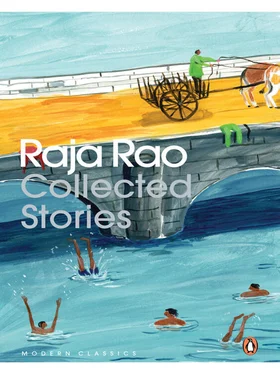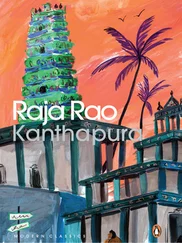Raja Rao - Collected Stories
Здесь есть возможность читать онлайн «Raja Rao - Collected Stories» весь текст электронной книги совершенно бесплатно (целиком полную версию без сокращений). В некоторых случаях можно слушать аудио, скачать через торрент в формате fb2 и присутствует краткое содержание. Год выпуска: 2014, Издательство: Penguin, Жанр: Классическая проза, на английском языке. Описание произведения, (предисловие) а так же отзывы посетителей доступны на портале библиотеки ЛибКат.
- Название:Collected Stories
- Автор:
- Издательство:Penguin
- Жанр:
- Год:2014
- ISBN:нет данных
- Рейтинг книги:5 / 5. Голосов: 1
-
Избранное:Добавить в избранное
- Отзывы:
-
Ваша оценка:
- 100
- 1
- 2
- 3
- 4
- 5
Collected Stories: краткое содержание, описание и аннотация
Предлагаем к чтению аннотацию, описание, краткое содержание или предисловие (зависит от того, что написал сам автор книги «Collected Stories»). Если вы не нашли необходимую информацию о книге — напишите в комментариях, мы постараемся отыскать её.
Collected Stories — читать онлайн бесплатно полную книгу (весь текст) целиком
Ниже представлен текст книги, разбитый по страницам. Система сохранения места последней прочитанной страницы, позволяет с удобством читать онлайн бесплатно книгу «Collected Stories», без необходимости каждый раз заново искать на чём Вы остановились. Поставьте закладку, и сможете в любой момент перейти на страницу, на которой закончили чтение.
Интервал:
Закладка:
‘Once the Prince of Oudh came to his court.’ ‘To his court,’ repeats Bhedia. And fingers in their mouth the children are in rapt attention. Only the one-year-olds on the waists of their ayahs are in tears. ‘O take me home. O take me home.’ I’ll give you honey, baby, I’ll give you a piece of gold,’ sings Bhedia, and the babies become silent. The quiet Ganga flows. The dippers are dipping, the crows are cawing. The vultures vociferate from high pipal tops. On terraces the wet clothes of pilgrims hang with assiduity. The more the sun, the more holy would they be. The bazaars seem of a sudden silent — it’s noontime and people like to eat and rest. Shalwar Khan now pushes the Naga’s head down with the oboe and fixes back the lid of the serpent-box. And then drags out a bamboo-basket from his large cloth-sack. Putli will still come out from some terrace, boys, having disappeared before you, into the earth. Life is so like an oboe song.
‘Ready, jump in,’ orders Shalwar Khan. Putli turns round and round on himself, greeting the spectators with folded hands.
Now suddenly he flops into the bamboo-basket and stretches himself flat, while Shalwar Khan carefully draws the lid on top, and covers it all with a red mango-leaf design muslin cloth. Shalwar Khan then swings his hand thrice round and round the box muttering a secret something to himself, and shouts: And then there is absolute silence as if the world has disappeared. ‘Hé, my son, Putli, my son, Putli, go to heaven and come. Do you hear, go to Indra’s kingdom and return.’ ‘And return,’ murmurs Bhedia, sobbing, sobbing.
‘Bhedia,’ shouts Shalwar Khan, ‘Bhedia, throw up the cloth. Tear open the lid.’ Bhedia does what he is told, for life after life, as you will know, he was only born to lift the lid off the magical basket. ‘And now, ye genteel folk of Benares, ye, men and women, search where you will, and you will find there is no Putli anywhere. He’s gone, he’s gone. The basket is empty. Look, kick at it and see. Here, I thrust this shimmering sword into it and see. Where is Putli gone? There’s no Putli. In the kingdom of Rama, when Dasaratha had sent his son away in exile, people wept and said: Oh where have you gone, O son,’ relates Shalwar Khan, standing up and swinging his drum. ‘O son,’ says Bhedia, as if he knew exactly the meaning of the story and had rehearsed it. ‘“O father,” says the holy son, “I am gone nowhere. Let Bharathji, my ever-devout brother, rule in my place. But if you want to see me, just do one thing— call me, and I’ll come from any tree, any terrace.” “Come, my son,” says Dasarathji, I want so much to see you, I cannot sleep without a vision of your holy presence.”’ ‘Presence, O Revered Father and King, and here I come,’ shouts Putli from that high terrace, there beyond the tamarind tree. How did he get there? Under the earth and up into the sky? The children are wonderstruck. Yes, Putli went under the earth and came out of heaven, there! ‘Yes, Putli is a bright boy,’ says Shalwar Khan, lifting the lid off the snake-box. ‘Is he not, Hé, My Lord Naga, Lord of Dharma?’ The Naga Lord hisses and plays with the music as if heaven and earth were indeed of one matter made, and Bhedia and Putli were of course denizens of a true and higher world. ‘Why, Benares is all like that,’ auntie said, when she took little Girija home.
Girija has come from Kashmir for the Ram Lila. It’s wonderful to travel by bus and train, and be in Benares as if you were always there. Girija, who’s now five years old, has been three months in Benares. He loves Benares because here children play. They play in gangs. For example, between house and house there are established links, and newcomers are immediately taken into the fold. There are no strangers in Benares. The king of the young is one Mohendra. Mohone, as they call him, is a good big boy, you think because he tends cows. That’s not the truth at all, as any boy on Dashashwamedha Ghat will tell you. Mohendra and his gang are interested in teasing Sadhus, in thieving mangoes from shops, stealing clothes from bathers, and cigarettes from men’s pockets. And money from anywhere. Mohendra and his gang are well set, and have a code of honour. You have to eat Mohone’s spittle three times, and you’re joined on to the fold. Mohone is eleven but he looks fifteen. His gang has some twenty persons unless you count Bhedia as one of them. If you do so you must add five, for Bhedia is at least five men at the same time, and at five different places. And Bhedia is like their prophet. If Bhedia says: Go left, it means bad luck for your enterprise. If Bhedia spits on a side, it’s bad luck too. But if Bhedia is talking of his horses for some reason it’s always good luck. Sometime Putli would like to join the gang. But Putli is never out of his father’s sight. Putli knows all his father’s secrets. Putli can have no friends. A snake charmer has only three friends. His oboe, his snake, and his wand. Otherwise all the universe is ash. And Putli has come to accept it: ‘And the Prince has come back to you, Father,’ says Putli walking with folded hands, straight through the astonished audiences, to his father. And never will speak a word more to anyone.
Today Mohone has gone on some errand for his family. So pockmarked Kishen is the overlord. Kishen’s father is a clerk in the railways. And Kishen is always being beaten at home. His mother died some three years ago, and he and his two sisters seem to live, so to say, for the fathering of their father. Kishen has already accepted the idea of running off to Bombay with Mohone. Make money, and returning, keep the family in trim shine. They say in Bombay there are so many cinema studios, and, curl on his brow, an open shirt at the neck, flower behind his ear, Kishen is good-looking, and you could always have a part, in the films, if you are good-looking. Kishen loves Dev Anand, and he will go and say: ‘Star, I want to be a great actor like you. Take me.’ And Dev is just waiting for Kishen. On the other hand, Mohone’s hero is Prithvi Raj. A hero is one who fights a battle. And Mohone loves battles. He likes even unruly cows when they kick as he milks. His father has nine cows, and the cows’ milk deliberately increased with good Ganges water sold at one rupee four annas a seer. For pilgrims Ganga is holy, and so is Benares milk. One day Kishen and Mohone will take the Bombay Express at Mughal Sarai, and the people at home can beat their mounts as at their own funeral. Benares is no good for ambitious people. ‘What do you say to that, Bhedia?’ ‘O, O,’ says Bhedia, ‘the red horses of Indra have no noose, for the air in Heaven is so pure one needs no noose there. And the lotuses that bloom in Heaven, the blue lotuses, are what the horses eat, and the horsegrass is eaten by man,’ and seeing fallen grass (from some funeral on mango packaging), Bhedia puts it into his mouth and remarks: ‘Sweet as sugar! Sweet as sugar!’
Mohone however had a dream. Why not take Putli with him? With Putli the trio would work better. ‘Hé, Dasaratha’s son,’ you shout in the middle of the Bombay streets, and from the top of high Bombay buildings, there he comes, does Putli. ‘Why not steal him?’ thought Mohone. Kishen liked the idea. The only thing is to follow the trace of the magician, and for this, Bhedia is the best guide. Somehow Bhedia seems to be exactly where Shalwar Khan will come. How is this you may ask?
The answer is: ask the moon? Or ask Jhaveri Bai, the fine Brahmini cow lying on the street cobblestones, chasing away her flies, shaking her ears and nibbling away at a fallen string. Some South Indian Chettiar had bought her, left her for carrying his ancestor’s journey safely to the other world; and Jhaveri Bai has lived on for eight or nine years here in real regal splendour. Everybody loves her off Dashashwamedha Ghat because she is what she is. Jhaveri Bai is so gentle and civilized. Unlike the other cows she does not go and steal. She stands in front of a shop as if to say: Will you honour me? And the cow always got her mouthful of fruit or grains, unless it were some crook, and then she goes politely and stands elsewhere, thinking, thinking.
Читать дальшеИнтервал:
Закладка:
Похожие книги на «Collected Stories»
Представляем Вашему вниманию похожие книги на «Collected Stories» списком для выбора. Мы отобрали схожую по названию и смыслу литературу в надежде предоставить читателям больше вариантов отыскать новые, интересные, ещё непрочитанные произведения.
Обсуждение, отзывы о книге «Collected Stories» и просто собственные мнения читателей. Оставьте ваши комментарии, напишите, что Вы думаете о произведении, его смысле или главных героях. Укажите что конкретно понравилось, а что нет, и почему Вы так считаете.












